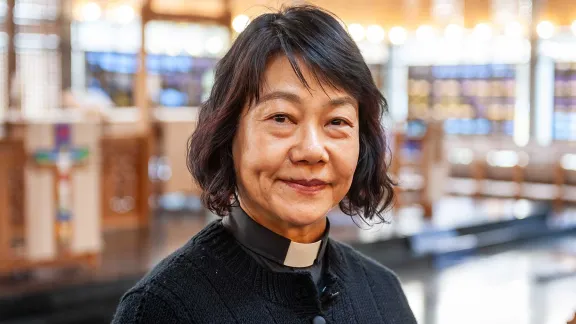From her Korean Buddhist origins, Anglican college life, to becoming a Lutheran church Vice-President, it’s been 20 years since Rev. Heeme Yang “knocked on the seminary door.”

Rev. Heeme Yang, Vice-President, Japan Lutheran Church. Photo: LWF/S. Gallay
Voices from the Communion: Rev. Heeme Yang, Vice-President, Japan Lutheran Church
(LWI) – The Japan Lutheran Church (JLC) has been an associate member church of The Lutheran World Federation (LWF) since 1999. In 2021, JLC decided to ordain women as pastors.
Rev. Heeme Yang, one of its first two ordained women pastors, shares her journey from fashion design to studying theology, what it means to be church in an ageing society, and ecumenical opportunities in a Christian minority context.
Please tell us about yourself?
I grew up in a Buddhist family in South Korea. After high school, I came to Japan in 1989 with the dream of becoming a fashion designer. Just before leaving, I was baptized in one of the evangelical churches in Korea.
Where did you study theology and what inspired you?
In Japan, I joined a fashion design college. In the spring of 1990, during a Sunday morning prayer in church, I felt overwhelmed by my constant struggle to find meaning in styling garments, to literally cover people’s nakedness. I realized that despite this strong desire, I was naked inside. Would I give up my long-held dream and study theology?
I set aside a year of prayer and entered the Christian Studies Department of Rikkyo (St Paul) University, affiliated to the Anglican church. My desire to live with Japanese people and share God’s Word grew stronger, and in 1992, I joined the Japan Lutheran College, a church university, where I studied theology for four years. This was my first encounter with Lutherans, and I soon became a member of JLC, commonly known as Nihon Ruteru Kyodan (NRK).
Could you describe your journey to ordination?
After graduating from university, I tried to enrol at the Japan Lutheran Seminary, but JLC informed me that women could not become pastors, so I could not join the seminary. But in 2002 the General Assembly approved the position of deaconess in the church, and I enrolled at the seminary in April 2003. For my practical work, I was a special minister at Fukagawa Megumi Lutheran Church in Hokkaido. During this time, I also got married and became a mother. After graduating from seminary, I was assigned to Omiya Zion Lutheran Church, where I worked for 14 years as a deacon. In this position, I performed the same duties as a pastor: administering the sacraments, conducting baptisms and having responsibility for teaching in a church where there was no official pastor.
In April 2021, JLC’s 18th Assembly approved the ordination of women as pastors, and at the same meeting, elected me as the church’s Vice-President. It’s been about 20 years since I first knocked on the door of the seminary. Although it was a long journey, we met many fellow believers, and through sharing our struggles and prayers, our mutual faith deepened.
What does being a woman pastor and Vice-President mean for you?
I was ordained as a pastor in July 2021 by then JLC President Rev. Shin Shimizu. I am currently the pastor of Kugenuma Megumi Lutheran Church in Kanagawa region. As a pastor, I have the same responsibilities as I did as a deacon, so my work has not changed. However, I am happy to be able to confidently demonstrate to the public that men and women work equally. JLC currently has two female pastors.
Since I became Vice-President, I have come to know the situation of other churches. JLC is a small church, quite self-oriented and closed in. The challenge, however, is how we can richly deliver the joy and comfort of the gospel in the wider view of what church really means.
What are some of the challenges and opportunities as a Lutheran church in the country?
Japanese largely practice spirituality and religious rites through the traditions of Shinto and Buddhism, Christians are less than two percent of the population. Japan is an aging society, and the church too. Young people don't come to church, as it seems like an unattractive place to them. There are hardly any devotees who want to become pastors, and the number of churches without pastors is increasing. With 1,800 members, our church has 20 pastors and 33 congregations. How can we invite young people to church? We need to go back to the real center of the gospel to live again the freshness of the Good News.
How can this be realized in a context where Christians are a minority?
The churches of most Japanese denominations are becoming older and smaller, and they face the same challenges. So, rather than working within one’s own parishes that are sometimes far away, it is more realistic to join hands with other denominations nearby, share good things and challenges, and explore what can be done together, while respecting each other’s cultures and traditions.
My parish, Kugenuma, is slowly starting to put this into practice. About three times a year, we hold worship services to which members of other denominations are invited. On 9 December 2023, an ecumenical Christmas service was held at Fujisawa Catholic Church. On 20 January 2024, churches gathered at the Fujisawa Baptist church to celebrate the Week of Prayer for Christian Unity. In addition, a service for peace is held in August every year at one of the 20 churches in the city.
Last November, you participated in the annual LWF Retreat of Newly Elected Leaders (RoNEL), what stood out for you?
I met pastors — bishops, presidents, and brothers and sisters — I didn't know before, and I was able to see another me in them. Like me, they have experienced times of suffering, disappointment and hopelessness, and moments of: “I might not be able to do this anymore.” This was certainly a time to experience being in communion. I realized that I was not alone and that there are such wonderful people in the world, and we are all workers who manifest the triune God.
What does it mean for the JLC to belong to the LWF communion?
JLC was founded by a conservative Lutheran mission body. But JLC became an associate member of the LWF in 1999. A few years ago, the founding mission body decided to cut links with us due to our 2021 decision to ordain women as pastors. It is sad, but I think this is an opportunity for a new beginning.
It is difficult for us to go out and visit people in need around the world. But as a member church of the Lutheran communion, it is wonderful to see the LWF and its staff working for these people.


